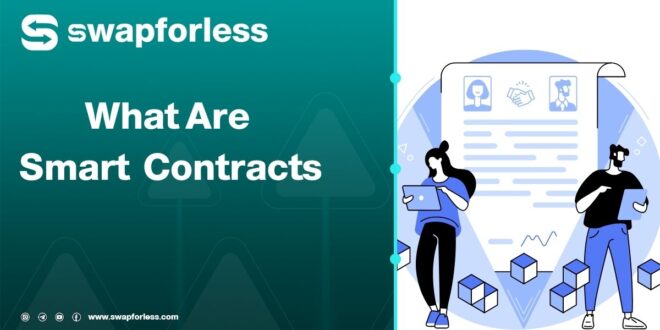Think about the fact that any agreement or deal you enter into—whether it is buying a house, renting a car, or even getting a loan—could be executed automatically, without paperwork or a middleman to help the process along. What may sound like the stuff of the future is, in fact, achievable today with the use of smart contract technology.
But what makes this technology different? And why is everyone talking about it as a revolutionary tool across multiple industries?
In this article, we’ll take you through a simple and straightforward journey to understand what are smart contracts and how they work, with everyday examples that show how this technology can transform the way we deal with everyday agreements.
If you wish to learn about a technology that may be included in your life in the very near future, then you’ve come to the right place.
What Are Smart Contracts?

Smart contracts are computer programs that are pre-programmed to execute a set of instructions if certain conditions are met. Smart contracts execute automatically and do not require any human intervention during their execution.
To better grasp the idea, let’s compare traditional contracts and smart contracts. When you have traditional contracts, you need to write the agreement, sign it, and then execute it manually or through intermediaries such as banks or lawyers.
For example, suppose you’d like to rent a house using a smart contract. You can define the terms of the rent, such as the amount of rent and when the payment shall be made, in the contract. When the payment date arrives, the smart contract, by itself, transfers the funds from your account to the landlord’s account.
But what is it about smart contracts that is so unique? The answer lies in three significant areas: automation, transparency, and security. Let’s now examine more closely how these contracts work.
What is DeFi: Decentralized Finance in Crypto 2025
How Do Smart Contracts Work?

To have an idea of how smart contracts work, think of them as small programs with a set of rules and instructions already written. Once the rules are fulfilled, the contract is automatically executed. The basic steps are as follows:
- Writing the Contract:
The very first step in creating a smart contract is programming it with the assistance of specific programming languages. While programming the contract, all the terms necessary are defined. For instance, if you want to create a smart contract for a car sale, you can define a condition such as: “When the full payment is made, the ownership of the car will be transferred to the buyer.” - Publishing the Contract on the Blockchain:
Once the contract is written, it is posted on the blockchain network. That is, the contract now lives on thousands of devices across the globe, and hence, it is tamper-proof and immutable. Also, as the contract is on the blockchain, it can be accessed from anywhere in the world, which improves its usability. - Condition Satisfaction:
A smart contract works like a vending machine. When the prescribed conditions are met (such as paying a specified amount or presenting a document), the program automatically executes the required action. If you have a smart contract for the online purchase of a product, the payment is automatically transferred to the seller when the product is delivered. - Execution and Verification:
The contract executes itself, and all operations are recorded on the blockchain. This enables all the participants to see what is happening in real time, and it ensures transparency while preventing manipulation.
Advantages of Smart Contracts
You might be wondering why you should care about smart contracts. The answer is the huge benefits offered by this technology. Let’s explore the advantages of smart contracts:
- Reduced Costs: Since there are no intermediaries like banks or lawyers involved, the costs are significantly reduced. This helps the parties involved save money that would have been incurred as payment to intermediaries.
- Transparency and Security: Since smart contracts are on the blockchain, all data is permanently recorded.
- Speed and Efficiency: Smart contracts are implemented instantly as soon as the conditions are met, saving time and energy. Instead of waiting for days or even weeks to execute a traditional contract, a smart contract is carried out within seconds.
- Trust: As the agreement is made on the basis of code rather than humans, there is no room for fraud or error.
- Customizability: Smart contracts can be customized to suit various needs, whether they are business transaction-oriented or personal in nature.
- Decentralization: The most prominent feature of smart contracts is decentralization. Thanks to the blockchain, there is no need for any central authority to manage the contract. This encourages autonomy and reduces the likelihood of manipulation.
Examples of Smart Contracts
To help clarify the concept of smart contracts in more practical terms, let’s look at some real-world examples:
- Decentralized Finance (DeFi): Smart contracts have one of the most extensive uses in decentralized finance. For example, you can invest or take a loan without utilizing a bank. All this is done through the utilization of smart contracts.
- Real Estate Transactions: As mentioned earlier, smart contracts can be used to automate the transfer of payment and the completion of purchases as soon as ownership is registered. This reduces the time and cost of employing traditional intermediaries.
- Supply Chain Management: Companies use smart contracts to track goods from their origin to the final consumer, making the process transparent and reducing the chances of fraud. For instance, a company can verify that a product was produced sustainably before purchasing it.
- Insurance: A smart contract can be programmed to pay the insured automatically when a specific event occurs. For example, if you have a natural disaster insurance policy, the smart contract can automatically check weather reports and pay compensation if the conditions are met.
Electronic Voting: Smart contracts can be used to ensure the integrity of an election. Votes are stored on the blockchain by the system, making the process transparent and tamper-proof.
Frequently Asked Questions
Are smart contracts legal?
Smart contracts are lawful in the majority of countries, although this is contingent on local legislation. However, with the growth in popularity of the technology, more governments may be encouraged to offer a legal framework to support it.
Is a smart contract editable after its publication?
No, a smart contract, once deployed on the blockchain, can no longer be altered. So, it’s essential to ensure the contract is well-written before deploying it.
Can smart contracts be hacked?
While smart contracts are very secure, they are not foolproof. If there is an issue with the coding, there may be weaknesses that can be exploited.
What is the best smart contract programming language?
Some of the popular programming languages used for developing smart contracts are Solidity, Vyper, Rust, and others.
Conclusion
If you’ve reached this point, you now have a clear and simple concept of what smart contracts are. But instead of looking at them as tools that are out of reach or only for experts, we can say that they are simply a new—and smarter—way to manage agreements and deals in our daily lives.
Does that imply that smart contracts will take over all that we understand of traditional agreements? Possibly not just yet, but they are certainly a huge step in the way of a smarter, more efficient tomorrow.
Finally, therefore, perhaps the most important question is less “What are smart contracts?” than it is “How can we more effectively use them?” The answer, naturally, is to seek out their potential and utilize them to improve our lives and our work in more innovative and transparent ways.
 swapforless blog
swapforless blog



